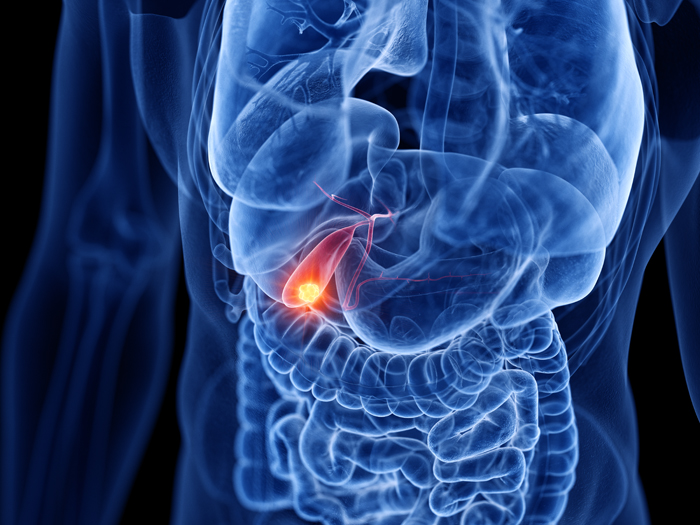Best Gallbladder Cancer Treatment in Alwarpet, Chennai
Gallbladder cancer starts when there is an uncontrolled growth of cells in the gallbladder. The gallbladder is a small pear-shaped organ in the liver that stores the bile fluid that helps to digest the fats in the foods passing through the small intestine. Gallbladder cancers are sporadic, and even if it is removed, your body functions normally. It is usually asymptomatic and hard to diagnose at the early stages makes it challenging. Most gallbladder cancer specialists perform surgery at the initial stages before cancer spreads to the other parts of the body.
For diagnosis and treatment, visit any of the gallbladder cancer surgery hospitals in Chennai. Alternatively, you can search for the best gallbladder cancer specialists near me.

What are the Types of Gallbladder Cancers?
Most of the gallbladder cancers are of adenocarcinomas. They start in the gland-like cells at the lining of the digestive tract or any other surfaces of the body. Another type is papillary adenocarcinomas, they are finger-like projections developed across the liver, and the lymph nodes have a better prognosis. Other rare types of cancer that start from the gallbladder are adenosquamous carcinomas, squamous cell carcinomas, and carcinosarcomas.
What are the Symptoms of Gallbladder Cancer?
Gallbladder cancer symptoms include:
- Abdominal pain in the upper part of the abdomen
- Abdominal bloating
- Sudden weight loss
- Jaundice
- Fever, nausea, and vomiting
- Lumps in the abdomen
What are the Causes and Risk Factors of Gallbladder Cancer?
Although there is no exact cause of gallbladder cancer, like all the other cancers, they form when gallbladder cells develop mutations in their DNA and grow without limitation. If not treated, it may spread to surrounding tissues and other parts of the body. Gallbladder cancer may also occur if any abnormalities of the bile ducts, gallbladder polyps, typhoid, or any family history of cancer.
Other risk factors of gallbladder cancer include:
- Gallstones: Your gallbladder becomes infected or inflamed when gallstones(chunks of hard material that contain cholesterol) block the bile ducts and reduce its flow. It is called cholecystitis, and it may be an acute or chronic problem.
- Porcelain gallbladder: It is a condition when calcium gets deposited at the gallbladder wall, which may result from chronic gallbladder inflammation.
- Age and Sex: Cancer typically affects people of age above 60, and most people are around 65-70 when found. Women are more likely to get affected with gallbladder cancer than men.
Diagnosing Gallbladder Cancer: When to See a Doctor?
It is difficult to identify at the early stages because of its small size and its presence deep inside the body. However, some gallbladder cancers are discovered when the gallbladder is removed for cholecystitis or any other condition. So, if you observe any abnormal symptoms, consult the best gallbladder surgery specialist to start the screening process or perform the tests if they observe any tumors. Some of them are blood tests, imaging tests, and ultrasound tests like MRI, CT scan, abdominal ultrasound, percutaneous transhepatic cholangiography(PTC), and endoscopic retrograde cholangiopancreatography(ERCP) for detecting a blockage in bile ducts.
Request an appointment at Apollo Spectra Hospitals, Alwarpet, Chennai
Call 1860 500 2244 to book an appointment.
What are the Treatment Options for Gallbladder Cancer?
The goal of the treatment is to cure the condition, extend longevity, and relieve symptoms.
- Surgery for gallbladder cancer: The surgery procedure is complex and requires an experienced surgeon. So, consult with the best gallbladder specialist near you for better treatment.
- Potentially curative surgery: It is performed when gallbladder cancer is detected early. It is performed to remove the gallbladder (Cholecystectomy) or the portions of the liver and bile ducts(Radical Cholecystectomy).
- Palliative surgery: It is done to relieve pain or prevent other complications, such as blockage of the bile ducts. It is performed when the cancer tumor is too extensive to be obliterated.
- Radiation therapy: It uses high-energy X-rays to destroy cancer cells. Radiation therapy may be performed after the surgery or as a part of the surgery.
- Chemotherapy: When these drugs are administered orally or intravenously, they enter the bloodstream and attack the dividing cells quickly. It may be used along with or without radiation therapy.
Conclusion
Although gallbladder cancer is rare and very difficult to identify at early stages, gallbladder specialists suggest that frequent screening after a certain age is necessary to avoid cancer spreading to other parts of the body.
The risks and side effects are expected with any surgery, but it depends on how much tissue is removed. Common risks may include pain at the incision site, bleeding, blood clots, or infection controlled by medications. Serious risks are bile leakage into the abdomen and liver failure.
After surgery for gallbladder cancer, follow a specific type of diet and perform physical exercises or take nutritional supplements to lower the risk of cancer developing or coming back. If in case your cancer recurs, immediately consult a nearby gallbladder specialist for screening tests.
No, even if the gallbladder is removed, bile fluid directly flows into the intestine and digests the food fats. Nevertheless, you should avoid high-fat or high-fiber foods because they are harder to digest.
Symptoms
Our Top Specialities
NOTICE BOARD
CONTACT US
CONTACT US
 Book Appointment
Book Appointment


.svg)
.svg)
.svg)
.svg)








